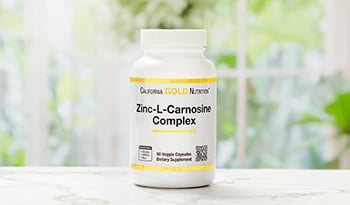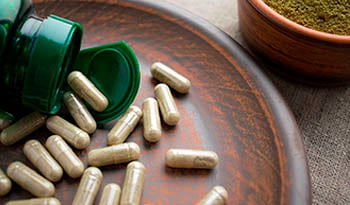L-Carnosine: An Underutilized Dietary Supplement
DISCLAIMER:This blog does not intend to provide diagnosis...

Carnosine is a naturally occurring molecule composed of two amino acids, histidine and alanine. As a dietary supplement, it has been available for years. However, it is not nearly as popular as it should be based on the existing science. Carnosine functions in “excitable” tissues, such as muscle and nerve tissue, and reaches high concentrations in skeletal muscle. In these tissues it is critically important in maintaining the proper pH and electrical charge.
Carnosine is often confused with carnitine. Both contain the root word carn, meaning flesh, as they are both found in higher concentrations in meat (and fish). Since vegetarian sources of protein are do not contain carnosine, a vegetarian (especially vegan) diet may not provide adequate pre-formed carnosine, but like carnitine the human body is thought to be capable of manufacturing sufficient quantities. Nonetheless, like carnitine, supplementation with carnitine has its place in nutritional medicine. At this time, clinical studies in humans has shown carnosine supplementation to:
- Improve muscle function and recovery from muscle fatigue.
- Protect against degeneration of the brain as well as loss of cognitive function and memory associated with aging.
- Improve mental function and behavior in children with attention deficit disorder and autism.
- Heal peptic ulcers when it is combined with zinc.
A Closer Look at Carnosine Functions
In addition to being important in regulating the electrical charge in excitable tissue, research has shown carnosine to be important to cellular health for other reasons. In muscles, carnosine neutralizes the extensive formation of lactic acid during high-intensity exercise and promotes recovery from exercise. These effects accelerate the working capacity of muscle exhausted by preceding exercise and explain carnosine’s popularity among bodybuilders and athletes for improving muscle function and recovery from muscle fatigue.
Carnosine is also an important intracellular antioxidant. Carnosine has been proven to scavenge reactive oxygen species (ROS) as well as protect against peroxidation of cell membrane fatty acids during oxidative stress. It has also demonstrated significant anti-aging effects related in part to its antioxidant effects, but it also prevents glycation (the attachment of sugar molecules to proteins) associated with premature aging.
Carnosine is especially critical in protecting the brain against neurodegeneration as well as loss of cognitive function and memory. Carnosine has also been shown to rejuvenate connective tissue cells, which may explain its beneficial effects on wound healing as well as its use in trying to fight off the effects of aging in the skin, causing wrinkles and loss of elasticity. Carnosine levels in the body decline with age. By the time a person is 70 years old, carnosine levels have decreased in their body by 63%. Because of all of these effects and others, carnosine is becoming well known as a longevity and anti-aging nutrient.
Clinical Research with Carnosine
The primary focus of the clinical research on carnosine has focused on its anti-aging effects as well as its effects on brain function.
In regards to general anti-aging effects, several clinical studies have highlighted the potential of carnosine in slowing down the aging process by preventing oxidative damage as well as glycation. In addition, carnosine has also been shown to directly and indirectly inhibits release of inflammatory mediators such as cytokines. Reducing silent inflammation is becoming another key target not only for an anti-aging strategy, but also to help prevent the development of chronic degenerative diseases like heart disease, diabetes, and neurodegenerative disorders like Parkinson’s and Alzheimer’s disease. Given the unique actions of carnitine within the brain, it may be an ideal agent for preventing age-related declines in cognitive function and memory as well.
In regards to boosting brain power, several double-blind, placebo-controlled studies have looked at the use of carnosine in patients with neurodegenerative conditions. In one study compared a daily dose of either 0.75 g or 2 g of carnosine to a placebo, for 21 days, in 42 patients with chronic encephalopathy a brain disorder that is a progressive degenerative disease most often seen in individuals with a history of multiple concussions and other forms of head injury. Significant improvements in cognitive function and reductions in oxidative stress were found in the carnosine group.
Another study examined the effect of 1.5 g of carnosine daily for 30 days in Parkinson’s patients treated with L-Dopa. The addition of carnosine to the treatment regimen significantly improved neurological symptoms, with a 36% improvement in symptoms compared to a 16% improvement in the control group. Clinical signs of Parkinson’s disease, including decreased bodily movements, and rigidity of extremities, were also significantly improved. This improvement in the “everyday activity” of Parkinson’s patients allows them more independence and better quality of life, leading the authors of the study to conclude that carnosine is a reasonable way of improving the treatment of Parkinson’s disease and decreasing the possible toxic effects of standard drug therapy.
Because of carnosine’s beneficial effects in improving both muscle and brain function, researchers at Georgetown University recently assessed its effects in Gulf War illness (GWI) or Chronic Multisymptom Illness (CMI); terms used to describe the disabling fatigue, widespread pain, and cognitive dysfunction experienced by about 25% of 1990-1991 Persian Gulf War veterans.
A leading theory proposes that GWI/CMI is the result of wartime exposure to a variety of factors including vaccinations, various chemicals, and stress. These factors initiate prolonged production of inflammation, free radicals, and the resulting injury to the brain, nervous system and muscle tissue. Since carnosine has been shown to protect the brain and muscle cells from the sort of damage underlying GWI/CMI, a double-blind, placebo-controlled study was designed to determine if nutritional supplementation with L-carnosine would significantly improve pain, cognition and fatigue in GWI. The 12-week study involved 25 GWI subjects who were given L-carnosine at 500, 1000, and 1500 mg increasing at 4-week intervals or a placebo. Primary outcomes included measures assessing cognitive function; feelings of fatigue and pain; and activity levels. The only measure that showed consistent benefit was the influence of carnosine supplementation on improving mental function.
While researchers had hoped to see improvement in all areas of GWI/CMI, the ability of carnosine supplementation to improve mental function in these patients was significant and adds additional clinical support for carnosine in this application.
Carnosine may also be helpful in improving brain function in autism. In one double-blind, placebo-controlled trial in 31 children with autism carnosine was shown to improve expressive and receptive vocabulary and subjective improvement on an autism rating scale over an 8 week trial at a dosage of 800 mg/day.
Zinc Carnosine to Relieve Peptic Ulcers
Zinc increases mucin production in cell culture studies and has been shown to have a protective effect on peptic ulcers in animal studies. In human studies, zinc supplementation appears to be helpful for healing peptic ulcers with zinc bound to carnosine being the most beneficial. Clinical studies in humans using zinc carnosine demonstrate not only an ability to heal peptic ulcers, but also antagonize the bacteria (Helicobacter pylori or H. pylori) linked to indigestion (dyspepsia), peptic ulcer disease, and stomach cancer. When 60 patients suffering from dyspepsia with H. pylori infection were given either antibiotics alone (lansoprazole, amoxicillin, and clarithromycin) or antibiotics plus zinc carnosine for seven days, better results were seen with the group getting zinc carnosine (94% success rate vs. 77%).
In one double-blind trial, 248 patients with confirmed gastric ulcers were randomly assigned to 1 of 4 groups receiving 150 mg daily of zinc-carnosine extract or its respective placebo, or 800 mg of cetraxate hydrochloride (a mucosal protective agent) or its respective placebo. Study medications were started within 1 week of endoscopy-diagnosed gastric ulcer and were continued for 8 weeks. At 8 weeks, 75% of the zinc-carnosine group experienced markedly improved symptoms compared to 72% for the cetraxate group. The endoscopic cure rate was 60.4% in the zinc-carnosine group and 46.2% in the cetraxate group at 8 weeks.
Dosage Recommendations
The typical dosage recommendation for taking advantage of the anti-aging effects of carnosine is 1,500 to 2,000 mg per day. For children with autism, the dosage is 800 to 1,000 mg per day. For peptic ulcers and indigestion, the dosage for zinc carnosine is usually 75 mg twice daily.
There are no adverse effects or drug interactions at the recommended dosage levels.

 By Dr. Michael Murray, N.D.
By Dr. Michael Murray, N.D. 


